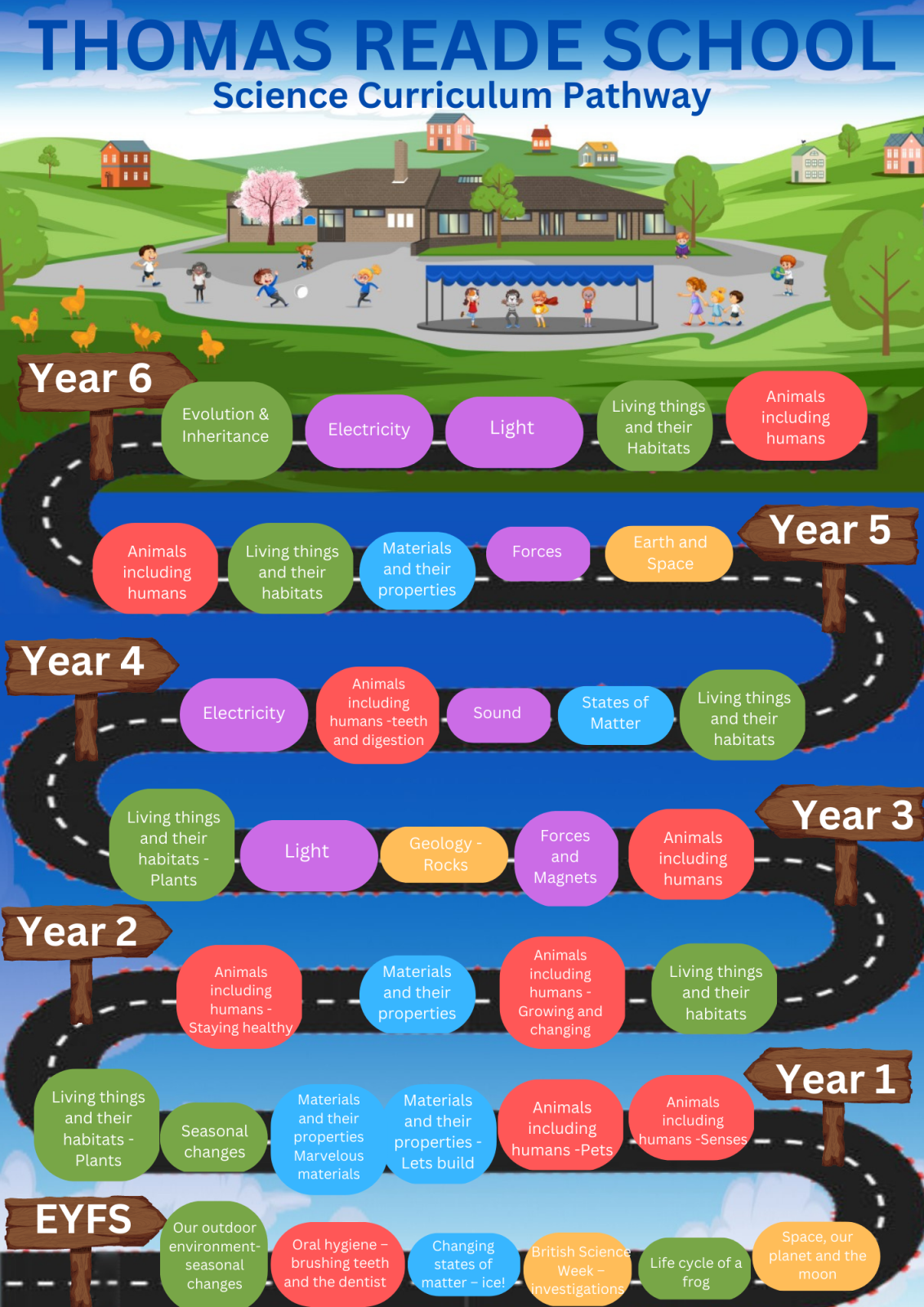Science

VISION
I have a vision – that each and every young scientist at Thomas Reade will be filled with wonder by the natural and physical world around them. Their minds will soak up every ounce of information as skilled teachers take them on an awe-inspiring journey of knowledge and investigations. They will learn to love the sciences and develop curiosity about everything around them. Questions such as what is, why will, how did and why do will sit on the tips of their tongues as they delve deeper to discover more about the universe they live in. Passion for their learning and understanding will flow out of them as they aspire to be the best scientists that they can be. By the time they leave Thomas Reade, they will be fully equipped with the skills and knowledge to make their way in life as young scientists going on to Secondary School and possibly into science careers in the future.
INTENT
Through a positive and caring environment, it is our intention at Thomas Reade to develop in all young people a lifelong curiosity and interest in the sciences.
Aims
We aim to develop scientific knowledge and conceptual understanding through the specific disciplines of biology, chemistry and physics.
We aim to develop understanding of the nature, processes and methods of science through different types of science enquiries that help them to answer scientific questions about the world around them.
We aim to equip children with the scientific knowledge required to understand the uses and implications of science, today and for the future.
Our Intent
• To provide a curriculum that caters for the needs of all individuals.
• To develop children’s scientific skills and understanding of the world around them.
• To ensure that they become confident scientists who are not afraid to take risks.
• To develop independent, inquisitive learners who have secure scientific knowledge and an interest in self-improvement.
• To build upon children’s prior knowledge from previous topics taught.
• To ensure coverage of the specific disciplines of biology, physics and chemistry.
• To provide challenge for children through high quality activities which include practical elements.
• To give children opportunities to embed scientific enquiry skills within each topic.
• To encourage children to develop and use a range of skills including: planning investigations, making predictions, making observations, analysing results and drawing conclusions.
• To give children a range of scientific vocabulary with which they can embed within their scientific studies.
IMPLEMENTATION
• High quality first teaching delivers appropriately challenging work for all individuals.
• Teachers follow The National Curriculum, and use Twinkl as a basis for their lessons.
• Teachers are given opportunities to extend their scientific knowledge and delivery of the curriculum through CPD and Staff Meetings.
• The progression of skills for working scientifically are developed through the year groups and scientific enquiry skills are of key importance during lessons.
• Through revisiting topics, children are given opportunities to ensure learning is “baked” into long term memory.
• The use of a range of scientific resources including “OGDEN Trust boxes”. • Rich questioning using accurate scientific vocabulary.
• Support for children who need to close the gaps and for children that need challenging. • Effective deployment of support staff during science lessons.
• Cross Curricular Opportunities – when relevant, science will be linked to other areas of the curriculum.
• Continuous monitoring of pupils’ progress against expected attainment for their age.
• Assessment – ongoing formative assessment (KPIs) and end of term/year summative assessment tests (Based upon Rising Stars Assessment). • Science Fayres in school and “Young Inventors Competition”
• Opportunity to attend Abingdon Atom Festival • Visits from local science specialists to enhance the curriculum
• Links with local Secondary school (Abingdon Boys) – opportunities for children to attend workshops and science shows
• Opportunities for children to attend science clubs at the local secondary school.
• Secondary school teachers to come in and deliver CREST Star and CREST Superstar Science Awards to year 3 and year 5 children
IMPACT
Attainment and progress is measured across the school using ongoing formative assessment during lessons. Termly assessments of current topic content is carried out using the Rising Stars Science Assessments. Teacher judgements are recorded on our internal tracking system.
Staff
• More confident when teaching lessons – thanks to CPD and Staff Meetings
• More confident doing practical investigations – Staff Meetings (OGDEN boxes) & CREST teachers
• More ideas thanks to Science Fayres & Year 5/6 investigations day
• Better understanding of where their topics fit into the bigger curriculum picture
• Ability to assess both summatively (Adapted Rising Starts) and formatively (Teacher judgements)
• Can better identify pupils which are falling behind or have gaps
• Can now ensure that they have no overlap with other year groups when teaching certain topics
Pupils
• More enjoyment from practical lessons – CREST & teachers more confident doing investigations
• Gained different experiences – trips to Abingdon School/visitors to school
• Find vibrant science displays, including key vocabulary, helpful in science lessons
• Children have enjoyed going to the ATOM festival and seeing the investigations
• Children loved having opportunity to bring in demonstrations/investigations for Science Fayres
• Certain pupils benefitted from going to Science Club at Abingdon School – greater opportunity to do investigations using equipment not usually able to use
• Children amazed by what they saw using microscopes in Year 6 and on trips to Abingdon School
Long Term Overview


